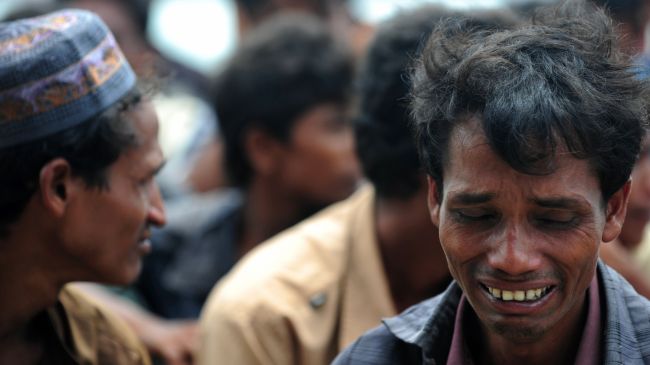Malaysians protest over persecution of Rohingya Muslims


Thousands of people in Malaysia have taken to the streets in protest at the ongoing violence against the minority Rohingya Muslims in Myanmar.
The protestors gathered in front of the Myanmar Embassy to voice their outrage at the persecution and massacre of Muslims in the Southeast Asian country.
They demanded a meeting with the officials of the Myanmar Embassy. Their request, however, was declined by the Myanmar’s officials.
The demonstrators also called for an immediate end to the violence against Rohingyas.
Reports say some 650 Rohingyas have been killed in the Rakhine state in the west of the country in recent months. This is while 1,200 others are missing and 80,000 more have been displaced.
The UN says decades of discrimination have left the Rohingyas stateless, with Myanmar implementing restrictions on their movement and withholding land rights, education, and public services from them.
The world body has also described the Muslim community as the Palestine of Asia and one of the most persecuted minorities in the world.
Earlier this week, the Human Rights Watch (HRW) condemned the Myanmar government for the killing of minority Rohingya Muslims during a recent wave of sectarian violence in the country.
“Burmese (Myanmarese) security forces committed killings, rape, and mass arrests against Rohingya Muslims after failing to protect both them and Arakan Buddhists during deadly sectarian violence in western Burma in June 2012,” the rights organization said in a report on Wednesday.
HRW also called on Myanmar to “take urgent measures to end abuses by their forces, ensure humanitarian access, and permit independent international monitors to visit affected areas and investigate abuses.”
The Buddhist-majority government of Myanmar refuses to recognize Rohingyas, who, it claims, are not natives, and classifies them as illegal migrants though the Rohingy as are said to be Muslim descendants of Persian, Turkish, Bengali, and Pathan origin, who migrated to Myanmar as early as the eighth century.







